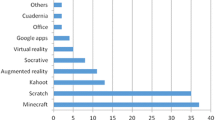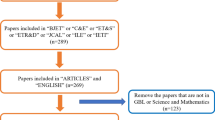Abstract
The present study explores the potential of improving the attractiveness and efficiency of academic lectures at university science courses with the use of online game-based tools. The main purpose of the study was to investigate the extent to which the use of Kahoot can increase learners’ attendance, interest and active participation in the science lectures, and whether it can demonstrate students’ better cognitive results in science learning. A number of 287 university learners from pedagogical departments, aiming to be prospective primary education level teachers participated in the research. Students’ semester final examinations results, note taking, personal interviews and a focus group discussion were used as research tools. According to the findings, the integration of Kahoot in the teaching lecturing process enhanced students’ enthusiasm, class anticipation, attendance and active participation. Students displayed a higher percentage of success in the final exams, as opposed to previous years’ lower performance.
Access this chapter
Tax calculation will be finalised at checkout
Purchases are for personal use only
Similar content being viewed by others
References
Gallardo-Echnique, E.E., Marques-Molias, L, Bullen, M., Strijbos, J.W.: Let’s talk about digital learners in the digital era. Int. Rev. Res. Open Distrib. Learn. 16(3), 157–187 (2015)
Sharp, J.G., Hemmings, B. Russell, K., Sharp, J.C.: Academic boredom and the perceived course experience of final year Education Studies students at university. Leeds Becket repository, pp. 1–53 (2017)
Tsihouridis, C., Vavougios, D. , Ioannidis, G.: Assessing the learning process playing with Kahoot – a study with upper secondary school pupils learning electrical circuits. In: Auer M.E., Guralnick D., Simonics I. (eds.) Proceedings of the 20th International Conference on Interactive Collaborative Learning. AISC, vol. 1, pp. 1108–1118. Springer, Cham (2017). https://doi.org/10.1007/978-3-319-73210-7_70
Brown, W.: Effective Lecturing. University of North Carolina at Chapel Hill, Suggestions and reflections on teaching and learning (2012). https://cfe.unc.edu/wp-content/uploads/sites/326/2014/08/FYC6.pdf. Accessed 1 April 2022
Opdal, P.A.: To do or to listen? Student active learning vs the lecture. Stud. Phil. Educ. 41, 71–89 (2022)
Sanda, A.A., Mazila, E.A.: The effect of lecture and discussion methods of teaching on learner’s performance in social studies in continuing education institution Borno State Nigeria. Front. Knowl. J. Ser. Int. J. Educ. Educ. Res. 1(1), 1–40 (2017)
Zakirman, Z., Lufri, L., Khairani, K.: Factors influencing the use of lecture methods in learning activities: teacher perspective. In: 1st International Conference of Innovation in Education (ICoIE), Advances in Social Science, Education and Humanities Research, vol. 178, pp. 4–6 (2018)
Poirier, T.I.: Is Lecturing obsolete? Advocating for high value transformative lecturing. commentary. Am. J. Pharm. Educ. 81(5), article 83, 1–2 (2017)
Regmi, K.: A review of teaching methods – lecturing and facilitation in higher education (HE): a summary of the published evidence. J. Effect. Teach. 12(3), 61–76 (2012)
Cannon, R., Knapper, C.: Lecturing for Better Learning, Green Guide N. 13, STLHE SAPES (Society for Teaching and Learning in Higher Education), Australasia (2012)
Kaur, G.: Study and analysis of lecture model of teaching. Int. J. Educ. Plan. Administ. 1(1), 9–13 (2016)
Cerbin, W.: Improving student learning from lectures. Scholarsh. Teach. Learn. Psychol. 4(3), 151–163 (2018)
Loughlin, C., Lindberg-Sand, A.: The Use of Lectures: Effective Pedagogy or Seeds Scattered on The Wind? Springer, Higher Education (2022)
Leone, S.: The use of new technologies in advanced Italian classes. In: Proceedings of the Emerging Technologies Conference, pp. 18–21. University of Wollongong (2018)
Eastman, J.K.: enhancing classroom communication with interactive technology: how faculty can get started, College Teach. Meth. Styles J. – First Quart. 3(1), 31–38 (2007)
Sharma, A., Gandhar, K., Sharma, S., Seema, S.: Role of ICT in the process of teaching and learning. J. Educ. Pract. 2(5), 1–5 (2011)
Muncy, J.A., Eastman, J.K.: Using classroom response technology to create an active learning environment in marketing classes. Am. J. Bus. Educ. 2(2), 213–218 (2012)
Licorish, S.A., Owen, H.E., Daniel, B., George, J.L.: Students’ perception of Kahoot’s influence on teaching and learning. Res. Pract. Technol. Enhanc. Learn. 13(9), 2–23 (2018)
Plump, C.M., LaRosa, J.: Using Kahoot! in the classroom to create engagement and active learning: a game-based technology solution for elearning novices. Manage. Teach. Rev. 2(2), 151–158 (2017)
Ares, A.M., Bernal, J., Nozal, M.J., Sanchez, F.J., Bernal, J.: Results of the use of Kahoot! Gamification tool in a course of Chemistry. In: 4th International Conference on Higher Education Advances (HEAd 2018), pp. 1215–1222. Universitat Politecnica de Valencia, Valencia (2018)
Ismail, M.E.: Implementation of the gamification concept using KAHOOT! among TVET students: an observation. IOP Conf. Ser. J. Phys. Conf. Ser. 1140 012013, 1–8 (2018)
Batsila, M., Tsihouridis, C.: ‘Let’s go … Kahooting’ – teachers’ views on C.R.S. for teaching purposes, In: Auer M.E., Guralnick D. & Simonics I. (eds.) Proceedings of the 20th International Conference on Interactive Collaborative Learning, AISC, vol. 2, pp. 1045–1054. Springer, Cham (2017). https://doi.org/10.1007/978-3-319-73210-7_66
Cohen, L., Manion, L.: Educational Research. Metehmio, Athens (2000)
Diamantakou, K., Davou, M., Panousis, G.: New Technologies and Past Fears in the School System. Papazisi, Athens (2001)
Hsieh, H-F., Shannon, S.E.: Three approaches to qualitative content analysis. Qual. Health Res. 15(9), 1277–88 (2005)
Brown, W.: Presented at the UC Graduate Student Association Forum on the Cyber Campus, 11 Oct (2010). http://ucbfa.org/2010/10/wendy-brown-on-online-education/, Accessed 5 March 2022
Freeman, S., et al.: Active learning increases student performance in science, engineering, and mathematics. PNAS 111(23), 8410–8415 (2014)
Acknowledgments
This paper has been financed by the funding programme “MEDICUS”, of the University of Patras.
Author information
Authors and Affiliations
Corresponding author
Editor information
Editors and Affiliations
Rights and permissions
Copyright information
© 2023 The Author(s), under exclusive license to Springer Nature Switzerland AG
About this paper
Cite this paper
Tsihouridis, C., Batsila, M., Vavougios, D., Tsichouridis, A. (2023). “In Vivo” Science Learning - Academic Teaching Through a Game-Based Process. In: Auer, M.E., Pachatz, W., Rüütmann, T. (eds) Learning in the Age of Digital and Green Transition. ICL 2022. Lecture Notes in Networks and Systems, vol 634. Springer, Cham. https://doi.org/10.1007/978-3-031-26190-9_15
Download citation
DOI: https://doi.org/10.1007/978-3-031-26190-9_15
Published:
Publisher Name: Springer, Cham
Print ISBN: 978-3-031-26189-3
Online ISBN: 978-3-031-26190-9
eBook Packages: Intelligent Technologies and RoboticsIntelligent Technologies and Robotics (R0)




